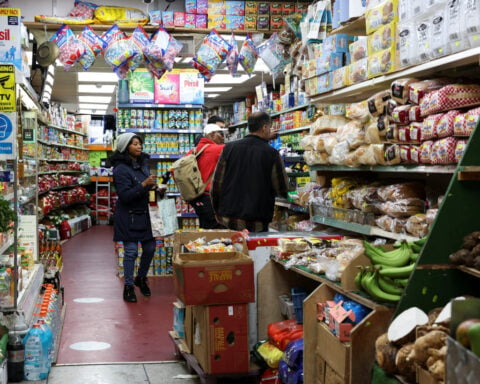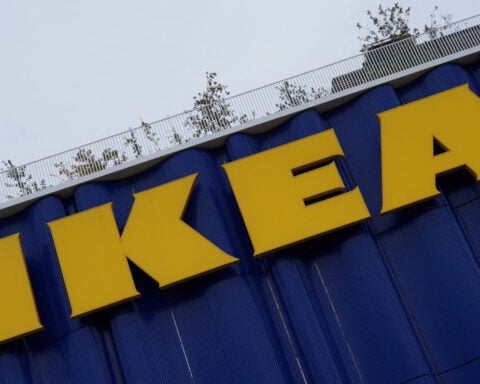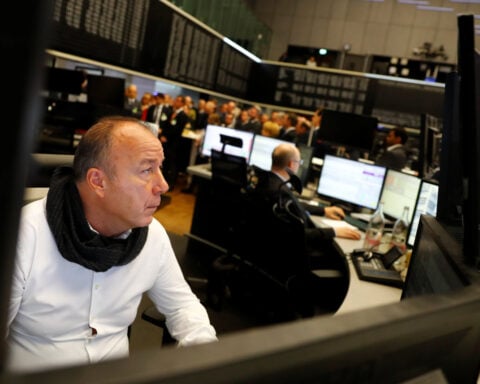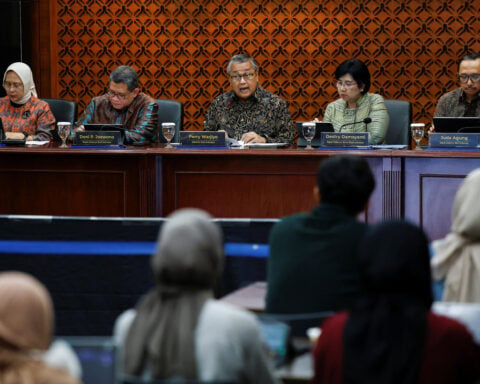Starbucks and the union organizing its workers sued each other Wednesday in a standoff sparked by a social media post over the Israel-Hamas war.
Starbucks sued Workers United in federal court in Iowa Wednesday, saying a pro-Palestinian social media post from a union account early in the Israel-Hamas war angered hundreds of customers and damaged its reputation.
Starbucks is suing for trademark infringement, demanding that Workers United stop using the name “Starbucks Workers United” for the group that is organizing the coffee company's workers. Starbucks also wants the group to stop using a circular green logo that resembles Starbucks’ logo.
Workers United responded with its own filing, asking a federal court in Pennsylvania to rule that it can continue to use Starbucks' name and a similar logo. Workers United also said Starbucks defamed the union by implying that it supports terrorism and violence.
On Oct. 9, two days after Hamas militants rampaged across communities in southern Israel, Starbucks Workers United posted “Solidarity with Palestine!” on X, formerly known as Twitter. Workers United — a Philadelphia-based affiliate of the Service Employees International Union — said in its lawsuit that workers put up the tweet without the authorization of union leaders. The post was up for about 40 minutes before it was deleted.
But posts and retweets from local Starbucks Workers United branches supporting Palestinians and condemning Israel were still visible on X Wednesday. Seattle-based Starbucks filed its lawsuit in U.S. District Court for the Southern District of Iowa, noting that Iowa City Starbucks Workers United was among those posting pro-Palestinian messages.
In a letter sent to Workers United on Oct. 13, Starbucks demanded that the union stop using its name and similar logo. In its response, Workers United said Starbucks Workers United’s page on X clearly identifies it as a union.
“Starbucks is seeking to exploit the ongoing tragedy in the Middle East to bolster the company’s anti-union campaign,” Workers United President Lynne Fox wrote in a letter to Starbucks.
In its lawsuit, Workers United noted that unions often use the company name of the workers they represent, including the Amazon Labor Union and the National Football League Players Association.
Starbucks said it received more than 1,000 complaints about the union's post. The Seattle-based coffee giant said workers had to face hostile customers and received threatening phone calls. Vandals spray-painted Stars of David and a swastika on the windows of a Rhode Island store.
Some lawmakers, including Republican Sen. Rick Scott of Florida, called for boycotts of Starbucks.
“If you go to Starbucks, you are supporting killing Jews,” Florida state Rep. Randy Fine, a Republican, tweeted on Oct. 11.
Starbucks' official statements on the war have expressed sympathy for innocent victims in both Israel and Gaza.
“Starbucks unequivocally condemns acts of hate, terrorism and violence,” Starbucks Executive Vice President Sara Kelly wrote in a letter to employees last week.
Workers United hasn't issued its own statement. But its parent, the SEIU, said Tuesday that it has many members with family on both sides of the conflict and believes “all Israelis and Palestinians deserve safety, freedom from violence, and the opportunity to thrive.”
Starbucks Workers United has been operating under that name since August 2021, a few months before it unionized its first Starbucks store in Buffalo, New York. Since then, at least 366 U.S. Starbucks have voted to unionize. The campaign helped kick off a wave of labor protests by Amazon workers, Hollywood writers and actors and auto workers.
But Starbucks doesn't support unionization and hasn't yet reached a labor agreement at any of its unionized stores. The process has been contentious, with workers organizing multiple strikes. Federal district judges and administrative judges with the National Labor Relations Board have issued 38 decisions finding unfair labor practices by Starbucks, the NLRB said, including delaying negotiations and withholding benefits from unionized workers.

 Italy, Albania, UAE sign deal for energy subsea interconnection
Italy, Albania, UAE sign deal for energy subsea interconnection
 European shares advance as bond yields ease; soft inflation powers UK stocks
European shares advance as bond yields ease; soft inflation powers UK stocks
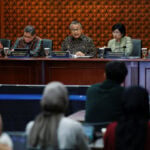 Bank Indonesia delivers surprise rate cut to support growth
Bank Indonesia delivers surprise rate cut to support growth
 Novak Djokovic breaks a tie with Roger Federer for the most Grand Slam matches in tennis history
Novak Djokovic breaks a tie with Roger Federer for the most Grand Slam matches in tennis history
 China's RedNote: what you need to know about the app TikTok users are flocking to
China's RedNote: what you need to know about the app TikTok users are flocking to
 British author Neil Gaiman denies ever engaging in non-consensual sex as more accusers come forward
British author Neil Gaiman denies ever engaging in non-consensual sex as more accusers come forward

